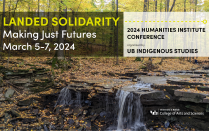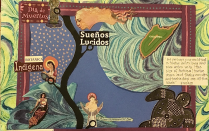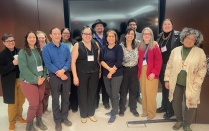2023-24 | Landed Solidarity: Making Just Futures
"In conceiving the theme of the conference, it was my intention to bring together a set of diverse scholars approaching land in a way that was generative, kind, and capacious. Situating the theme around land was about bridging various communities, connecting across various terrains— disciplinary and place-based—that could lead us into a vivacious conversation and new research that begins to answer complex problems." - Mishuana Goeman, Professor and Chair, Department of Indigenous Studies.

Program cover image

Isla de Cozumel, image provided by Claudia Ford

A group photo of some of the conference presenters.
Nya:wëh Sgeno! Welcome to the Landed Solidarities conference. When I first move to a place, I like to become landed. That is, I like to understand the plants, birds, and whole environment around me. As I was taught, I like to reach out to the first peoples, across differences, and connect to the various communities in place. Solidarity does not happen instantly or by my saying it. It happens by showing up, working, and planting seeds that will grow into solid relationships. Shawn Wilson reminds us that “an Indigenous research paradigm is relational and maintains relational accountability... so the methodology is simply the building of more relations” (2008, 73). I have gathered people today who have done just this in their research — built more relations. Moments of solidarity are often grown through sharing and caring in place.
In conceiving the theme of the conference, it was my intention to bring together a set of diverse scholars approaching land in a way that was generative, kind, and capacious. Situating the theme around land was about bridging various communities, connecting across various terrains— disciplinary and place-based—that could lead us into a vivacious conversation and new research that begins to answer complex problems. In imagining Property on day two, I take Brenna Bhandar’s, in The Colonial Lives of Property, question seriously who asks how we might “resist contemporary forms of dispossession without replicating logics of appropriation and possessiveness that rely upon racial regimes for their sustenance” (Bhandar, 2018a, p. 18). Across the two days, I hope we can make the most of this time as theorists, scientists, practitioners, and students who always need to find more spaces to convene and learn from various approaches and perspectives.
My best research days as a scholar have been on the land and in a diverse community. It did not feel like research, work, or a remote glance into a community, but rather, the doing and listening felt good. I only wish we could hold this conversation while planting or working to clean up a site, observe a beach, find the cause of toxins, combat more pollution, make art, or protect cultural heritage. Nevertheless, we do have the listening. We can learn so much from research sites rooted in place and learn to grow as scholars who tackle some of the most pressing issues of the day.
Nya:wëh (thank you),
Mishuana Goeman
Convener; Professor and Chair, Indigenous Studies, University at Buffalo; President-Elect of the American Studies Association
- Meztli Yoalli Rodríguez Aguilera (Assistant Professor, Latin American and Latino Studies, DePaul University)
- Robert Caldwell (Assistant Professor, Indigenous Studies, University at Buffalo)
- Luis Colón (SUNY Distinguished Professor and A. Conger Goodyear Professor, Chemistry; Associate Dean for Inclusive Excellence, College of Arts and Sciences, University at Buffalo)
- Jason Corwin (Clinical Assistant Professor, Indigenous Studies, University at Buffalo)
- Claudia Jeanne Ford (Professor and Chair, Environmental Studies, SUNY Potsdam and Distinguished Visiting Scholar, University at Buffalo)
- Mishuana Goeman (Professor and Chair, Indigenous Studies, University at Buffalo)
- Macarena Gómez-Barris (Timothy C. Forbes and Anne S. Harrison University Professor & Chair, Department of Modern Culture and Media, Brown University)
- Sandy Grande (Professor, Political Science and Native American and Indigenous Studies, University of Connecticut)
- Tiffany J King (Associate Professor, Gender and Sexuality, University of Virginia-Main Campus)
- Kelsey Leonard (Canada Research Chair in Indigenous Waters, Climate and Sustainability, University of Waterloo)
- Mia McKie (Clinical Assistant Professor, Indigenous Studies, University at Buffalo)
- M Murphy (Professor, Canada Research Chair in Science & Technology Studies and Environmental Data Justice, University of Toronto)
- Meredith Palmer (Assistant Professor, Indigenous Studies and Geography, University at Buffalo)
- Isabel Rivera-Collazo (Associate Professor, Department of Anthropology and Scripps Institution of Oceanography, UC San Diego)
- Shannon Seneca (Assistant Professor, Indigenous Studies, University at Buffalo)
- Audra Simpson (Professor, Anthropology, Columbia University)
- Deondre Aaron Smiles (Assistant Professor, Geography, University of Victoria)
- Gwynn Thomas (Associate Professor, Global Gender and Sexuality Studies, University at Buffalo)
- Lourdes Vera (Assistant Professor, Sociology and Environment and Sustainability, University at Buffalo)
- Agnes Williams (Community Consultant, Indigenous Studies, University at Buffalo)
Wednesday, March 6 | The Buffalo Room (10 Capen Hall, University at Buffalo)
8:00 am - 9:00 am | Check-in and Breakfast
9:00 am - 9:30 am | Opening
Ganö:nyök (opening conference) by Mia McKie University at Buffalo
Mishuana Goeman Convener, Professor and Chair, Indigenous Studies, University at Buffalo
Elizabeth Otto Director, Humanities Institute and Professor, Global Gender and Sexuality Studies, University at Buffalo
Theresa McCarthy Associate Dean for Inclusive Excellence, Associate Professor and Director, Indigenous Studies, University at Buffalo
9:30 am - 10:00 am | Grounding
Agnes Williams (Seneca Nation), “The UN Declaration of Indigenous Peoples and Local Education”
10:00 am - 11:00 am | Imagining Care in Landed Practices
Sandy Grande University of Connecticut, “Care and the discipline of life-in-place”
Claudia Ford University at Buffalo, “The Land Keeps The Score: Traditional Ecological Knowledge, Trauma and Healing”
Moderator: Gwynn Thomas University at Buffalo
11:00 am - 11:15 am | Break
11:15 am - 12:00 pm | Responses and Q+A
led by Mishuana Goeman
12:00 pm - 1:00 pm | Lunch Break
1:00 pm - 2:30 pm | Water Ways
M Murphy University of Toronto, “Learning with Birdsong and against Data in Canada’s Chemical Valley”
Meztli Yoalli Rodríguez Aguillera DePaul University, “ Grieving Geographies: Bodies of Water, Intimacy, and Loss in Mexico”
Isabel Rivera-Collazo UC San Diego, “With changing land and water: grounded research to understand place, cultural identity, and heritage under threat by changing climate”
Moderator: Luis Colón University at Buffalo
2:30 pm - 2:45 pm | Break
2:45 pm - 3:30 pm | Responses and Q+A
led by Shannon Seneca University at Buffalo
3:30 pm - 4:30 pm | Reception
Thursday, March 7 | The Buffalo Room (10 Capen Hall, University at Buffalo)
Beyond Property Towards Landed Solidarity
8:30 am - 9:00 am | Check-in and Breakfast
9:00 am - 10:00 am | “A Feminist Geography is an Indigenous Geography”
Presenter: Deondre Smiles University of Victoria
Responses and Q+A led by Robert Caldwell University at Buffalo
10:00 am - 10:10 am | Break
10:10 am - 11:15 am | “Trust in the Land”
Presenter: Macarena Gómez-Barris Brown University
Responses and Q+A led by Lourdes Vera University at Buffalo
11:15 am - 11:30 am | Break
11:30 am - 12:30 pm | “Gender/Sexuality Beyond Property”
Presenter: Tiffany J. King Duke University
Responses and Q+A led by Mia McKie University at Buffalo
12:30 pm - 1:30 pm | Lunch (Provided for all attendees)
1:30 pm - 2:30 pm | “Symbolic Sovereignty: Indigenous National Flags and Ecological Solidarity”
Presenter: Kelsey Leonard University of Waterloo
Responses and Q+A led by Jason Corwin University at Buffalo
2:30 pm - 2:45 pm | Break
2:45 pm - 4:00 pm | “Settler Apologia”
Presenter: Audra Simpson Columbia University
Responses and Q+A led by Meredith Palmer University at Buffalo
4:00 pm - 4:30 pm | Coming Together and Plans Forward
4:30 pm | Closing Ganö:nyök by Mia McKie University at Buffalo
5:00 - 6:30 pm | Closing Reception at University Club (202 Norton)
Presented by the UB Humanities Institute, organized by the Department of Indigenous Studies, and convened by Mishuana Goeman. This conference was made possible by the support of the University at Buffalo College of Arts and Sciences, with additional support of the Andrew W. Mellon Foundation.